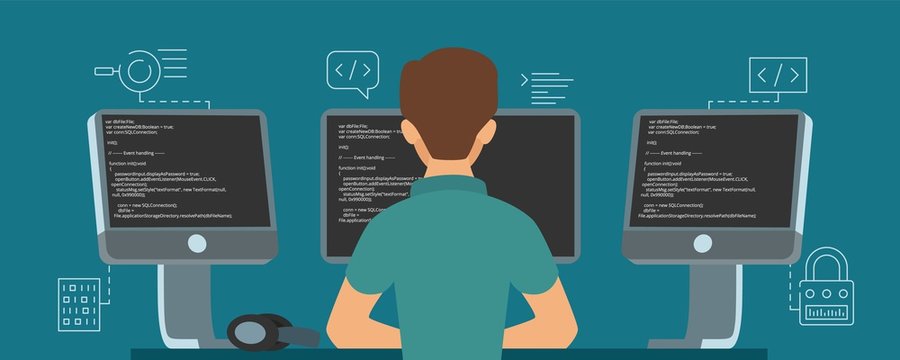Entry-level software engineers write code, test software, and collaborate with teams. Key skills include programming, problem-solving, and understanding data structures.
This article covers the key skills and responsibilities of entry-level software engineers, offering practical advice on how to break into the field and grow in your career.
What is an Entry-Level Software Engineer:

An entry-level software engineer is someone starting in the software development field, typically fresh from school or self-study. These professionals work under the guidance of more experienced engineers and contribute to coding, testing, and maintaining software applications.
While their tasks tend to be smaller in scope, they provide valuable opportunities to learn from real-world experience. This role is designed to help new engineers build a strong technical foundation while working on actual software projects.
Key Responsibilities of an Entry-Level Software Engineer:
Entry-level software engineers are tasked with a variety of duties that help them build hands-on experience. These responsibilities include:
Also Read: Do ML Engineers Make More Than Software Engineers – Comparing Salaries!
- Writing clean, efficient code to contribute to software applications.
- Testing and debugging code to ensure software works as expected.
- Collaborating with team members to integrate different components of software.
- Documenting code to make it easier for other developers to understand and maintain.
- Learning new technologies and techniques to stay current in the field.
How Entry-Level Software Engineering Differs from Other Roles:
Entry-level engineers focus on hands-on coding and learning, while senior engineers make decisions about system design, architecture, and scalability. Senior engineers often have a broader scope of influence and play a larger role in planning and leading projects.
For entry-level engineers, the focus is on gaining experience, solving coding problems, and collaborating with teams, all of which help them develop the skills needed for advanced roles in the future.
Essential Skills for an Entry-Level Software Engineer:

To succeed as an entry-level software engineer, you need a mix of technical and soft skills. Mastery of programming languages, familiarity with version control systems, and a strong understanding of data structures are crucial.
These core skills enable engineers to perform key tasks like writing clean code, working with databases, and debugging issues in software. As you gain experience, the depth of your technical knowledge and your ability to solve complex problems will grow.
Programming Languages:
Learn widely-used languages like Python, JavaScript, Java, C#, and C++. These languages are essential for various types of software development, from web applications to backend systems.
Each language has its strengths and is often chosen based on the nature of the project. For example, Python is great for quick prototyping and machine learning, while JavaScript is key for web development. Building fluency in one or two of these languages will give you the versatility to work on a wide range of projects.
Version Control Systems (Git):
Git helps developers track code changes, collaborate with others, and manage different versions of a project. It’s essential to know Git commands and how to collaborate using platforms like GitHub or GitLab.
Familiarity with Git allows teams to work together seamlessly by keeping track of changes made by different developers and merging code updates efficiently. For entry-level engineers, learning Git is vital for both individual and collaborative coding tasks.
Data Structures and Algorithms:
Understanding common data structures (like arrays, linked lists, and trees) and algorithms (such as sorting and searching) will help you solve problems more efficiently and prepare for technical interviews.
These fundamental concepts are at the heart of most coding challenges, both in job interviews and day-to-day work. Strong knowledge in data structures and algorithms enables engineers to write optimized code and tackle problems that arise during development.
Databases and SQL:
Knowledge of SQL and databases is key for storing and managing data. Learn basic SQL queries (SELECT, INSERT, UPDATE) and familiarize yourself with database design concepts.
Databases are used in nearly every software application, and understanding how to interact with them is essential. Entry-level engineers often need to write queries for retrieving or updating data and ensure that data is stored efficiently.
Frameworks and Libraries:
Familiarize yourself with popular frameworks like React for front-end development or Django for backend development. Frameworks simplify development by providing ready-to-use code for common tasks, allowing developers to focus on building features.
By learning frameworks, you can speed up your development process and deliver robust applications faster. Understanding the frameworks that complement your primary programming language is a key skill for entry-level engineers.
Testing and Debugging:
Testing ensures your code works as intended. Learn how to write unit tests, use debugging tools, and ensure software reliability through automated testing. Debugging is an essential skill for identifying and fixing errors in your code. Automated testing ensures that your code functions correctly, even as the project evolves over time. Entry-level engineers should be familiar with basic testing frameworks and debugging techniques to ensure their code is reliable and maintainable.
How to Break into Software Engineering as a Fresh Graduate:
Entering the software engineering field after graduation or self-study can be challenging, but with the right approach, it’s entirely achievable. Here’s how to get your first role. It’s important to focus on building both your technical and professional skills, as well as gaining relevant experience. By following a strategic approach, you’ll increase your chances of securing your first software engineering job.
Also Read: Project Management Software – A Step-by-Step Guide!
Leverage Your Education:
If you have a degree or relevant coursework, showcase your academic projects, internships, and skills. Highlight any hands-on coding experience. Your education is a great starting point to demonstrate your foundational knowledge, even if you don’t have much professional experience. Employers often look for candidates who have worked on real-world projects during their studies and have a solid understanding of core software engineering principles.
Build a Strong Portfolio:
Create a portfolio with personal projects or open-source contributions. This demonstrates your coding ability and initiative to potential employers. Having a portfolio of your work is a great way to showcase your skills and dedication to learning. Personal projects and contributions to open-source communities can demonstrate your ability to solve real-world problems and your passion for the field.
Prepare for Technical Interviews:
Technical interviews often include coding challenges, data structures questions, and problem-solving exercises. Practice on platforms like LeetCode and HackerRank to improve your skills. Being well-prepared for technical interviews is critical to your success in landing a job. It’s not only about knowing how to code, but also about being able to explain your thought process and solve problems efficiently under pressure.
Network and Attend Events:
Networking is crucial. Attend tech meetups, conferences, and connect with professionals on LinkedIn. Networking can help you discover job opportunities. Many software engineering roles are filled through referrals, and connecting with industry professionals can open doors that would otherwise be hard to access. Networking can also help you learn about the latest trends and best practices in the field.
Apply Widely and Be Persistent:
Don’t be discouraged if you don’t land a job immediately. Tailor your resume, apply to multiple companies, and stay persistent even if you don’t meet all the qualifications. The job market can be competitive, but persistence and a proactive approach are key to breaking into the industry. Keep learning, improving, and applying for roles, and eventually, your hard work will pay off.
Career Growth: From Entry-Level to Senior Software Engineer
Once you’ve secured an entry-level role, focus on continuous improvement and career growth. Your goal should be to expand your technical skills while also developing leadership and problem-solving abilities. As you gain experience and responsibility, you will have more opportunities to take on complex projects and progress to senior roles.
Seek Mentorship:
Mentors can provide valuable insights and guidance as you navigate your career. They help you learn from their experience and avoid common mistakes. A mentor can also offer constructive feedback on your coding practices and help you stay motivated through challenges. Having a mentor will not only accelerate your technical growth but also provide career advice and long-term guidance.
Specialize in a Domain:
As you progress in your career, think about focusing on specific fields such as front-end development, back-end systems, cloud computing, or machine learning. Specialization can set you apart in the job market. By focusing on a specific area, you can become an expert in that field and increase your value to employers. Specialization also helps in shaping your career trajectory toward leadership or niche technical roles.
Continue Learning:
The tech field evolves rapidly. Stay current with new technologies and methodologies by taking courses, reading books, and experimenting with new tools. Continuous learning is key to staying competitive and advancing in your career. Engage with online communities, attend workshops, and experiment with emerging technologies to keep your skills up-to-date.
Work on Soft Skills:
In addition to technical skills, soft skills like communication, problem-solving, and teamwork are vital. Practice working with teams and communicating clearly in both written and verbal forms. As you progress in your career, your ability to work effectively with others and manage conflicts will become increasingly important. Soft skills help you collaborate and lead teams, which is essential for senior-level positions.
FAQ’s
1. What does an entry-level software engineer do?
An entry-level software engineer writes code, tests and debugs software, and collaborates with a development team on building software applications.
2. What skills should an entry-level software engineer have?
Key skills include programming, version control (Git), understanding of data structures and algorithms, SQL, and basic testing/debugging knowledge.
3. How do I prepare for technical interviews?
Practice coding problems, study algorithms and data structures, and participate in mock interviews to simulate real interview scenarios.
4. What programming languages should I learn?
Common languages include Python, JavaScript, Java, C#, and C++, depending on the type of software development you’re interested in.
5. How long does it take to become a senior software engineer?
It typically takes 5-10 years, depending on experience, learning pace, and the complexity of the projects you work on.
Conclusion
Becoming an entry-level software engineer requires dedication, continuous learning, and a balance of technical and soft skills. By building a strong foundation, preparing for interviews, and embracing career growth, you can make a successful transition into this dynamic field. With persistence and focus, you can progress to senior roles over time.
Related Posts
Also Read: Corsair Keyboard Software – Features, Setup, and Benefits!
Also Read: Tax Preparation Software Can Help Prepare And File Your Taxes By _________. – A Complete Breakdown!



